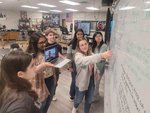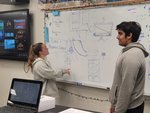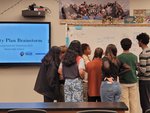


A group of Nease High students have come together to form an idea for a hydro-powered generator that has them named as a finalist in the state of Florida as part of the annual Samsung Solve for Tomorrow initiative.
The initiative put forth by Samsung seeks to inspire students to team up to come up with an idea for an invention that can be used to solve a problem that the world is faced with that can perhaps one day be used to help solve the problem in the future.
The team at Nease High came up with the idea for the generator after it was first proposed by fellow team member Yash Singh.
“It’s a little surreal, because I was involved with this project last year, but we didn’t make it this far,” senior Morgan Bourquin said.
Making it this far in the competition is a new experience for all those involved with the team, except for teacher Kevin Lay, who has been involved with the initiative for many years and even oversaw a team that had their invention selected as one of the top three in the nation while he was at a school in Missouri.
“I like to see a teacher’s role as more like an architect, where you’re a facilitator,” Kevin Lay said. “You give them all as much encouragement as you can and give them a safe place to meet and you just let them explode. It’s such a humbling experience to just sit back and watch it all take place.”
Nease High will receive $2,500 in Samsung technology and classroom supplies as a reward for the group being named one of 300 state finalists across the nation and there is an opportunity to earn $25,000 more if they continue to advance and are named one of 50 national finalists and $100,000 if they are one of the final three chosen past that point.
“At the beginning of the year when we got everyone in our group together, we came up with a list of problems in our community and we think of solutions we could move forward with,” Kendra Lay said. “Power insecurity was our chosen problem and Yash just really ran with the idea.”
The idea was one that came to the forefront of the students minds after going through the most recent hurricane season locally.
“Because we get a lot of hurricanes in this area of Florida, we thought that we could use the water from flooding to help generate electricity for homes when they lose their power,” senior Priscilla Sun said.
At first the hope to have it be able to power one appliance during testing, and once that is mastered it would then be able to be scaled up to eventually powering an entire room of a house and then the house as a whole.
The group has been working on the project since the start of the school year and now that they have made it as a state finalist, it means that they can now take their idea beyond the conceptual phase and begin to get deeper into the design phase and eventual construction of it.
The next step for the group is to get all the raw materials ordered that will be needed and begin mapping out the organizational plan for eventual construction of the prototype.
That is an aspect that Bourquin has been working hands-on with, as each student in the group has their roles within the project and hers is dealing with communication and lining up arrangements for the parts they will need.
“We’re also looking into working with some nonprofits after we’ve created the product, because we think it could really benefit them,” Bourquin said.
The fact that their idea is on the verge of becoming a reality is something that has the entire group anxious and excited to see what lies in store next.
“Having the go ahead to continue with our project and knowing that something we created could actually help others and eventually maybe even go beyond helping our local community but even help those in say the Midwest, where there are power outages due to tornados,” senior Bri Chua said.
The passionate vibes amongst the team is obvious from the minute you walk into Kevin Lay’s classroom and it is evident that he has created a fun atmosphere where creativity is ever free flowing.
“I think his teaching style really helps, because it’s not like he just comes in and tells us what to do, but instead he allows us to analyze and make our own decisions,” Lalit Mudunuri said.